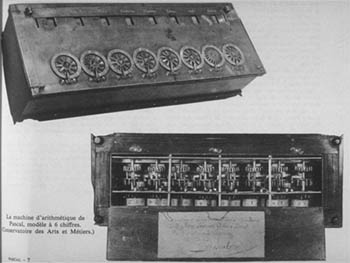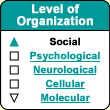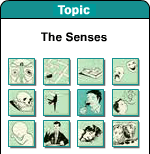Until the
middle of the 15th century, monks working as scribes copied
manuscripts by hand using various writing techniques. But
around 1450, Gutenberg perfected certain methods that led
to the printing revolution. It was a revolution because
suddenly, large numbers of copies of written works could
be produced relatively easily.
By making books inexpensive, the
printing press allowed the dissemination of all kinds of
ideas and made a knowledge-based society possible. Books
spread knowledge not only of the experimental sciences,
but also of the humanistic ideas of Rabelais, Montaigne
and many other great authors. Thus, the printing press
opened the way to the publication of encyclopedias and
the Age of Enlightenment.

Printing Shop in Lyon. A. Vénard,
book illumination, 16th century.

Pascal’s calculating machine
(1659), six-digit model: the ancestor of the modern computer.
Source: Conservatoire des Arts et
Métiers. |
|
Like the
invention of the printing press several centuries ago, the
advent of the computer is revolutionizing the human
ability to store information, images, and language. Today,
magnetic and optical technologies allow information to be
stored at speeds and densities that were unimaginable just
a few years ago.
In computer systems, there are two main types of peripheral
devices on which information is stored: magnetic storage
devices and optical storage devices. On magnetic hard drives
and diskettes, information is stored through the orientation
of tiny magnetic particles. On traditional optical disks
(CDs), information is stored in microgrooves of varying
lengths etched into the disk, and read back by means of
laser beams.
Writing, printing, and computers are tools that let us associate
meanings with representations. And this human societies externalization
of our representations and our memories could almost
be described as the chief characteristic of human
societies.
With the invention
of writing, society’s memory no longer depended
on individuals’ memories, but instead could
be externalized in a tangible, portable, reproducible
form. Past events could now be relived at will, even
if those who witnessed them were no longer alive.
But writing also fostered
the development of thought, by providing new intellectual
tools such as lists, tables, formulas, computation
algorithms, and so on. The availability of such
reliable, extensible forms of external working
memory also enabled people to deploy their thoughts
beyond the limits of their individual, internal working
memories. The result was the subsequent
invention of still more elaborate cognitive artifacts,
such as maps and calculating instruments, of which
today’s computers are the culmination.
The creation of computer networks and the Internet
represents a still newer form of external memory
that can classify and pre-process information for
us. This phenomenon is still too recent for its cognitive
and cultural effects on human beings to be discerned,
but we can already predict that these effects will
be substantial.
|
|






